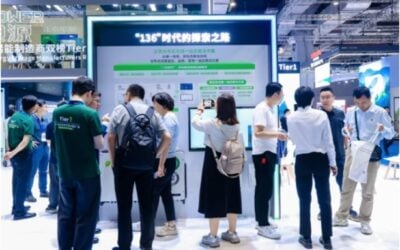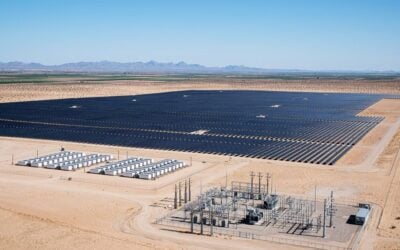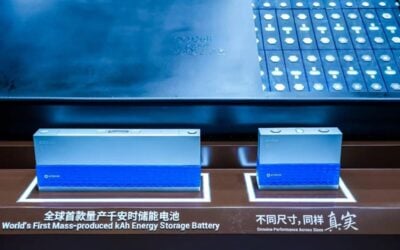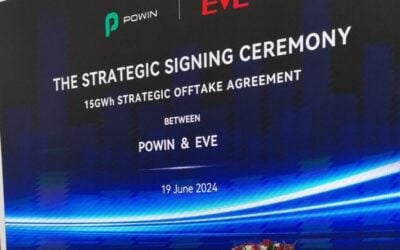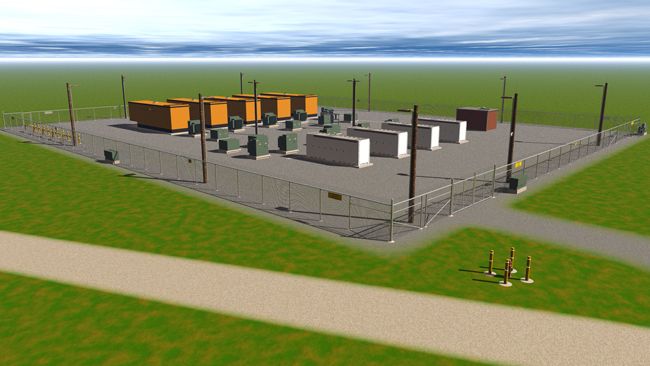
Battery storage equipment manufactured by CATL and recently installed at a US Marine Corps facility has been disconnected after the raising of security concerns about the China-headquartered maker.
Last week, news agency Reuters reported on 7 December that battery energy storage system (BESS) equipment at a solar-powered microgrid on Camp Lejeune Marine Corps Base (MCB) had been switched off by Duke Energy, the energy company tasked with building the project.
Enjoy 12 months of exclusive analysis
- Regular insight and analysis of the industry’s biggest developments
- In-depth interviews with the industry’s leading figures
- Annual digital subscription to the PV Tech Power journal
- Discounts on Solar Media’s portfolio of events, in-person and virtual
Duke Energy confirmed the accuracy of the report in a statement given to Energy-Storage.news by company director of communications and public affairs Kaitlin Kirshner, who said Duke Energy did not believe the equipment itself posed a threat but that the system has been switched off until the matter is resolved.
According to Reuters, the decision was made following high-profile accusations by US lawmakers that CATL – the world’s largest manufacturer and supplier of lithium-ion batteries – is directly funded and enjoys support from the Chinese Communist Party.
Senator Marco Rubio of Florida was among those to make the accusations, and at the beginning of December wrote a letter to the US Secretary of Defense Lloyd Austin demanding that the decision to install CATL battery units at Camp Lejeune be reversed.
“We write out of concern with regards to the installation of a battery and solar array by the Chinese Communist Party (CCP)-aligned Contemporary Amperex Technology Co Ltd (CATL), at Camp Lejeune, North Carolina as part of a new Battery Energy Storage System (BESS),” Rubio and colleagues wrote.
“A CCP-funded and supported firm should have no role or presence on a US military installation, especially one that trains US Marines for a potential conflict with China.”
Rubio also said other military installations should be checked for similar energy projects operated by CATL “or other CCP-affiliated companies”.
Accusations ‘false and misleading’, manufacturer CATL says
CATL, for its part, strongly refuted the allegations, publishing a statement last week (7 December). It described the accusations its batteries posed security threats as “false and misleading”.
“As a global technology company, CATL welcomes responsible discourse on important safety and security issues, and we take questions about our business seriously.”
The manufacturer said its US-based businesses and products do not collect, sell or share data, nor do they interact directly with critical infrastructure, such as the electric grid, noting that its products have passed US safety and security reviews to have entered the country’s market in the first place.
The story has echoes of the saga that has engulfed fellow Chinese technology company Huawei in its dealings in the US since 2019, with a ban on Huawei telecoms equipment sales upheld by US President Joe Biden in 2022.
CATL said that its energy storage products sold in the US, which include battery cells to complete containerised or cabinet-based solutions, only contain “passive” devices, and don’t allow the manufacturer control over the product, nor do they collect, save or transfer data.
The company pointed out also that its products do not connect directly to the grid. CATL supplies batteries to system integrators to use in BESS projects. The system integrator will then in turn connect to the grid, and CATL noted that grid operators’ layers of protection for their networks would prohibit manufacturers such as it from interacting with the grid directly.
Finally, CATL noted that as a publicly-traded company, counting many high-profile Western entities among its investors, it has a fiduciary responsibility to advance interests of shareholders that include the likes of JP Morgan and UBS.
CATL was found earlier this year to hold a 37% share of global lithium battery sales by SNE Research, and while this is largely based on its supply to the electric vehicle (EV) market, the company has in place multi-year supply deals in the US for BESS projects with the likes of system integrator FlexGen (10GWh), developer HGP Storage (5GWh) and others.
‘We welcome the ability to use American made batteries’
Duke Energy’s Kaitlin Kirshner told Energy-Storage.news that the installation at Camp Lejeune was designed “with security in mind” and that the CATL battery units were not connected to the Marine Corps Base’s network or other systems.
“These lithium iron phosphate (LFP) batteries act solely as an energy storage device and were connected to Duke Energy’s system with our robust network security and safeguards fully in place,” Kirshner said.
“Nevertheless, some concerns about this project have been raised, and Duke Energy disconnected these batteries as we work to address stakeholder and policymakers’ questions.”
Although the US government is looking to support its domestic battery manufacturing value chain, the country’s battery manufacturing capacity is a small fraction of China’s as yet.
“As an American energy company, we welcome the ability to use American manufactured batteries. Given the rapidly increasing demand for electricity, we support more domestic manufacturing to help expand energy resources in the United States and accelerate the energy transition,” Duke Energy’s Kaitlin Kirshner said.
Energy-Storage.news’ publisher Solar Media will host the 6th Energy Storage Summit USA, 19-20 March 2024 in Austin, Texas. Featuring a packed programme of panels, presentations and fireside chats from industry leaders focusing on accelerating the market for energy storage across the country. For more information, go to the website.


